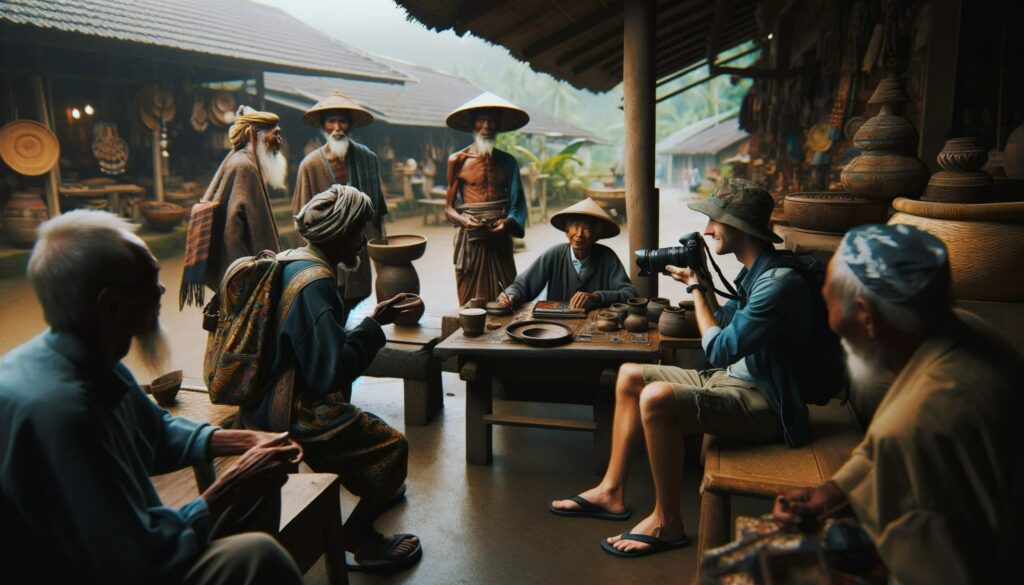Cultural immersion is more than just visiting a place; it’s about actively participating in the local way of life. By immersing yourself in a culture, you gain a deeper understanding and appreciation for the people and their traditions. This involves engaging with locals, trying authentic cuisine, participating in traditional activities, and sometimes even learning parts of the local language.
The Benefits of Cultural Immersion
Engaging deeply with a culture offers numerous benefits. It fosters greater global understanding, breaks down stereotypes, and creates memorable, meaningful travel experiences. Cultural immersion also encourages responsible tourism, where travelers are more mindful of their impact on the local community and environment.
Preparing for Cultural Immersion
Preparation is key to successful cultural immersion. Research the destination’s customs, etiquette, and language basics before your trip. Understand the do’s and don’ts to respect local norms and traditions. Being well-prepared shows locals your genuine interest and respect for their culture.
Engaging with Locals
One of the best ways to immerse yourself in a culture is through interaction with local people. Engage in conversations, participate in community events, and explore local markets. Be open and respectful, and you’ll find that many locals are eager to share their culture with curious travelers.

Participating in Local Traditions
Actively participate in local customs and traditions. Attend cultural festivals, try traditional attire, and learn about local arts and crafts. Such experiences provide a unique perspective on the culture and deepen your connection with the place.
Learning Through Food
Cuisine is a significant part of any culture. Taste local dishes, visit traditional eateries, and if possible, take a cooking class. Food tells a story about the people, their history, and their lifestyle, offering a delicious way to understand the culture.
Sustainable Practices in Cultural Immersion
Sustainability plays a crucial role in cultural immersion. It’s important to consider the environmental and social impact of your travel choices. Support local businesses, practice eco-friendly tourism, and be mindful of preserving cultural sites and traditions. Sustainable travel ensures that these cultures and places remain vibrant for future generations.
Overcoming Cultural Barriers
Cultural differences can sometimes lead to misunderstandings. It’s vital to approach situations with an open mind and a willingness to learn. Be patient, ask questions when unsure, and show respect for differences. Overcoming these barriers can lead to a more authentic and respectful cultural exchange.
Documenting Your Experience
While documenting your experiences, be sensitive to local norms regarding photography and sharing information on social media. Respect privacy and ask for permission before taking photos of people or sacred sites. Share your experiences in a way that honors and respects the culture.

The Role of Reflection in Cultural Immersion
Reflecting on your experiences is an essential part of cultural immersion. It helps in processing what you’ve learned and understanding your own cultural biases. Journaling, discussing with fellow travelers, or even blogging can be effective ways to reflect and share your insights.
Challenges and Rewards of Cultural Immersion
Cultural immersion can be challenging due to language barriers, cultural differences, and stepping out of your comfort zone. However, these challenges often lead to the most rewarding experiences, offering personal growth, deeper understanding, and lasting memories.
Embracing the Journey: The Lasting Impact of Cultural Immersion
In conclusion, cultural immersion is more than a travel strategy; it’s a journey towards global understanding and personal growth. By stepping into the lives of others, respecting their customs, and engaging with their traditions, travelers open doors to profound experiences that go beyond the typical tourist path. These encounters not only enrich the journey but also foster a sense of global citizenship, encouraging a deeper respect and appreciation for the diversity and complexity of the world around us. Whether it’s through a shared meal, a traditional dance, or a heartfelt conversation, the moments spent truly immersing in another culture leave a lasting imprint on the heart and mind. As you embark on your next adventure, remember that the true essence of travel lies in the connections you make and the experiences you embrace along the way. Cultural immersion is not just about seeing the world, but about letting the world change you, one incredible experience at a time.
FAQ
How can I find authentic cultural experiences while traveling?
Research before your trip, seek recommendations from locals, and look for experiences that involve direct engagement with the community, such as homestays, local workshops, or guided tours by local experts.
Is it important to learn the local language for cultural immersion?
While fluency isn’t necessary, learning basic phrases in the local language can greatly enhance your experience. It shows respect for the culture and often leads to more meaningful interactions with locals.
Can cultural immersion be experienced in both rural and urban settings?
Absolutely. Both rural and urban environments offer unique cultural experiences. Urban areas often provide a mix of modern and traditional, while rural settings can offer a deeper dive into longstanding traditions and practices.
How do I handle sensitive cultural topics while traveling?
Approach sensitive topics with respect and an open mind. Listen more than you speak, and be cautious about making assumptions. If discussing such topics, do so with those who are open to sharing their perspectives.
Can cultural immersion be a part of short-term travel?
Yes, even short trips can include cultural immersion. Focus on engaging activities like local tours, food experiences, and community interactions to make the most of your time.
How do I ensure that my cultural immersion is respectful and not intrusive?
Always seek consent for participation in local activities and photography. Be mindful of your impact, avoid stereotyping, and prioritize learning and listening over merely observing.

